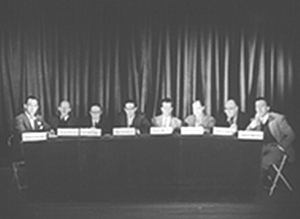b) The Hollywood Ten
In the 1950s, amidst the height of the Red Scare, a significant opposition movement emerged against Senator Joseph McCarthy’s anti-communist crusades. Central to this movement were the Hollywood Ten, a group of filmmakers known for their bold stance against McCarthyism. These individuals notably refused to testify before the House Un-American Activities Committee (HUAC), a decision that had profound personal and professional consequences.
The Hollywood Ten, comprised of writers, directors, and producers, were among the first in the film industry to openly challenge the HUAC’s investigation into alleged communist influences in Hollywood. Their refusal to answer questions about their political beliefs or to name others who might be communists led to convictions for contempt of Congress. This resulted in jail sentences and a widespread blacklisting within the industry, effectively ending many of their careers.
Their stand, though costly, played a crucial role in highlighting the dangers of political persecution and the erosion of civil liberties under McCarthyism. The actions of the Hollywood Ten and the subsequent blacklisting became a symbol of the excesses of the era’s anti-communist hysteria. It sparked a broader debate about the balance between national security and individual freedoms, a conversation that would resonate in American politics and culture for decades to come. The legacy of the Hollywood Ten is often remembered as a testament to the importance of standing up for constitutional rights and freedoms, even in the face of overwhelming societal and political pressure.

